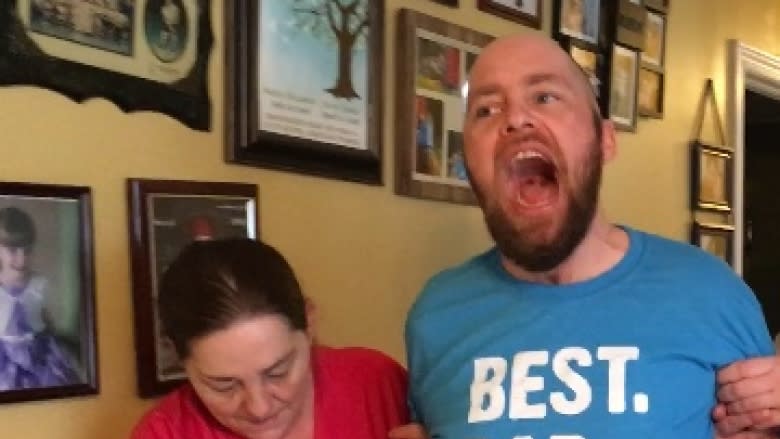Brain-injured man beating the odds, family fights for more rehab
It's been a long, hard road toward recovery for Jeremy Crocker, and it's far from over yet.
The 38-year-old Trout River man suffered a severe brain injury in an ATV accident in November 2015, and doctors told his family he'd very likely remain in a vegetative state.
Crocker's mother said he's come a long way in the past two years, but needs more rehabilitation to get back a bit more independence.
"We're hoping he's going to continue to do a little better. I'd like to see him at least walk from the bed to the bathroom. I'm not looking for big walking distances," Nancy Crocker told CBC's Corner Brook Morning Show.
The day everything changed
Jeremy Crocker was in the habit of wearing a helmet, but on the day of his accident left it behind.
His ATV overturned, and family members found him on the ground, with a cut on his lip the only visible sign of injury.
Crocker's head, however, had taken the brunt of the impact.
Initially, medical professionals didn't even think he'd survive, according to Jennifer Crocker, who has two children with Crocker. "It was wait and see. They didn't think he was going to make it through the night."
He was on life support at first, then needed a tracheotomy to help him breathe and a feeding tube to provide nourishment — facing life in a long-term care facility, unable to communicate.
"They felt that, if he became anything more than a vegetative state, it would be a miracle," recalled Jennifer Crocker.
Wouldn't give up
But Nancy Crocker fought hard to get her son whatever help was available, and refused to believe the dire prognosis.
"When they said that, my last words was, 'They're not God.'"
She lobbied hard to get Jeremy in rehab at the Miller Centre in St. John's, where he spent six months.
Progress was slow but significant. Crocker went from being barely able to open his eyes, to walking with two people standing beside him.
He is breathing normally, eating diced food, and drinking liquids that still have to be thickened so he can swallow them — things doctors felt would be impossible.
Slow, steady progress
The recovery is a family affair.
Crocker's parents provide nearly all his personal care, including hours spent each day on therapy to improve his physical ability and speech.
Hailey Crocker, 11, knows her Dad has come a long way, but it's still hard.
"He can now walk, and he can talk a bit. But you can't really understand him that well."
You really have to listen closely to distinguish the words Jeremy Crocker is struggling to say.
Ask him how he is, and his halting, moaning voice will tell you, "I'm doing good."
Nancy Crocker believes part of the reason her son is doing as well is that, in addition to the time at the Miller Centre, he also received two months of in-patient rehabilitation at the hospital in Corner Brook this winter.
"He learned to feed himself, he can eat now with a spoon, he can eat with a fork, he can pick his glass up and drink on his own," she said. "His transfers with getting in and out of the bed is a lot better than what it was."
More rehab needed
So she was frustrated in late January when she was told by Western Health that while Jeremy might get more rehab in the future, his in-patient help was ending, for now.
"We have to weigh the progress that the patient is making, and the realisticness of the goal that they are setting," said the director of patient services for medicine, Teara Freake, who wouldn't speak specifically about Crocker's file.
His mother hopes her efforts will make a difference for him, and for others with traumatic brain injuries.
"God forbid, if anything like this should ever happen to anybody else, they're going to be in the same situation I'm in. Like, where is the help? Where are the supports?"




